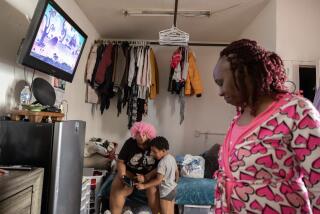Couple in La Jolla Cry Foul Over State Denial of Elderly-Care License
Mary O’Rourke has her Irish up over governmental bureaucracy in general and over the people in particular who have labeled her gracious home “unfit” and claimed she’s running the “Worst Little Boarding House in La Jolla.”
The fact is, she claims, state officials are trying to run her out of business so that her “guests” will be forced to move to the large, new nursing homes that have opened in recent years and are lacking patients.
O’Rourke and her husband, Raymond, opened O’Rourke Residential Care Home in the shadow of the posh La Jolla Beach and Tennis Club in 1975 and, for five years, did a thriving business in caring for the elderly under a residential care home license.
Ambulances Not Welcomed
She acknowledges that her enterprise creates a bit of disruption in the quiet La Jolla Shores neighborhood just a block or so from the palm-lined beach. The inevitable emergency ambulance arrivals in the wee hours of the night haven’t been welcomed on the otherwise-quiet Lowry Terrace.
There’s no love lost between O’Rourke and her neighbors, but she says she has no proof that they are using their considerable influence to prevent her from running her care home.
“There’s another Mary O’Rourke living around here,” she said. “Maybe they have the two of us mixed up. Maybe we are being blamed for things that she did.”
In 1980, O’Rourke said, the state Department of Social Services took over from the county the enforcement of licensing for residential care homes, and she found herself in instant trouble. But state officials say they have always issued the licenses.
“I was a teacher of handicapped children before I retired and had thought to open my home to them,” O’Rourke said. But county welfare officials urged her to turn her energies to the elderly because of the great need for small, neighborhood-based care facilities.
When the state took over the inspections and licensing, O’Rourke said, she found that her spacious La Jolla Shores residence wasn’t up to par, despite its million-dollar view and its half-acre of pines and landscaping.
Renewal Refused
When her license came up for renewal in November, 1981, the state inspectors refused to grant her another. Since then, O’Rourke said, “I’ve been harassed and driven crazy by inspectors and court hearings and such.”
In the seven years since she lost her license, O’Rourke has continued to care for elderly people in her home.
“I rent rooms,” she said.
State licensing inspectors say a residential care home, by any other name, is still a care home when its guests require aid in everyday activities such as dressing, walking or maintaining cleanliness. And a residential care home requires a state license.
Mary O’Rourke now has as guests a woman, bright-eyed and cheerful, who will soon celebrate her 102nd birthday, and another elderly roomer in her 80s, a former dancer and the spitting image of Martha Graham, who is confined to a wheelchair.
“We had seven fire inspections one year, when there is only supposed to be one,” O’Rourke complained. “They want us to have an 8-foot-wide hallway. Who has an 8-foot-wide hallway? And why?”
Licensing inspectors visited the O’Rourke home this week, asking the elderly guests whether they were happy, asking them if they knew what day it was and where they were.
“It upsets my guests terribly, and those people shouldn’t be coming out here while this matter is in court,” O’Rourke said.
Mary Delmast of the state licensing office in San Diego differs with O’Rourke’s assessment. It is the care that the elderly are, or are not, receiving that is causing the state to try to close down the O’Rourkes, she said.
Tom Hersant, the licensing office bureau chief, agrees. It is not the sumptuous surroundings that do not measure up, it is the level of care required by the O’Rourkes’ tenants. And these elderly people require aid that is not being provided, he said.
John H. Sanders, the state deputy attorney general who has been trying to shut down the O’Rourkes’ care home for more than three years, said the battle has been frustrating.
Although the state denied renewal of the license in 1981, he explained, the actual closure order was not issued until Sept. 6, 1985, because of appeals filed by the O’Rourkes’ son, Albert.
“Most families, confronted with the inevitable, would have given up and found some other way to earn a living. But not the O’Rourkes,” Sanders said.
After the O’Rourkes continued to operate a residential care home despite a court injunction against it, Sanders filed a criminal contempt-of-court complaint against them.
During the contempt hearings, Judge Richard Huffman--then a Superior Court judge who has since been elevated to the appellate bench--became concerned that Mary O’Rourke was mentally incapable of understanding the charges against her and ordered her to submit to a psychiatric examination, which she failed.
The judge declared a mistrial and ordered a re-examination of O’Rourke in six months. Earlier this month, attorney Albert O’Rourke said his mother had not kept the appointment for a re-examination in December because she was physically unable to. Superior Court Judge Michael Greer set a new examination date for Feb. 3 and continued the case until March 7, Sanders said.
In the meantime, O’Rourke continues to play hostess to her elderly guests, convinced that she, not the state, knows how to keep them healthy and happy.
For $65 a day, she is supplying a fine home, plenty of food, lots of tender loving care to her guests, she claimed, and “I don’t think the state has any right to stop me.”
More to Read
Sign up for Essential California
The most important California stories and recommendations in your inbox every morning.
You may occasionally receive promotional content from the Los Angeles Times.










